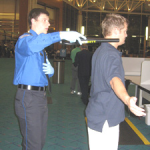As our readers will no doubt be aware, David Miranda – the civil partner of Guardian journalist Glenn Greenwald – was detained without charges or arrest last weekend and held for nine hours in Heathrow Airport by the Metropolitan Police, as The Libertarian’s Emile Yusupoff reported Wednesday. The police, who presumed the authority to detain Miranda on the basis of Schedule 7 of the controversial 2000 Terrorism Act, threatened him with arrest and prosecution if he tried to remain silent when questioned, searched and seized his computers, phones, and other electronic devices, and denied him access to an attorney. I trust, given the surname of the victim, that the irony of his treatment in these specific ways will not be lost on the many Americans following this story, who are familiar with the name given to their own protections against the police under U.S. law. This plain cosmic irony notwithstanding, the Home Office has released a statement this week praising the Metropolitan Police for their actions, defending them as grounded in the law.
“If the police believe that an individual is in possession of highly sensitive stolen information that would help terrorism, then they should act and the law provides them with a framework to do that,” reads the statement.
However, those with somewhat more authority to interpret what frameworks this law does and does not provide to the police to act in such a way have taken issue with the Home Office’s claims. Lord Falconer of Thoroton, one-time flatmate and Lord Chancellor of Tony Blair’s cabinet, who helped author the Terrorism Act and introduced it to the House of Lords, has sharply rebuked Home Secretary Theresa May and her office, explaining that his law clearly sets out for the police only the authority to detain individuals in order to assess whether they are involved in the commission, preparation, or instigation of terrorist acts. Mr. Miranda, merely the spouse of the journalist who has been reporting on the release of information by a third party (Mr. Edward Snowden) that has been alleged to be of possible use to terrorists – and thus four-times removed from the object of Scotland Yard’s efforts – is unambiguously not included in that mandate.
“I am very clear that this does not apply, either on its terms or in its spirit, to Mr. Miranda,” insisted Lord Falconer in a statement to the Guardian. “What is happening is they are targeting Miranda because they believe that he may have information that has been obtained from Snowden. The reason that doesn’t fall within schedule 7 is because: even assuming that they think there is material which has been obtained in breach of the Officials Secrets Act, the action of Miranda or anybody he is acting with could not be described as somebody concerned in the commission, preparation or instigation of acts of terrorism. You could not reasonably believe, if you were the state, that Miranda is commissioning or assisting somebody to commission terrorism, to prepare terrorism or to instigate terrorism.”
Instead, it is clear that Mr. Miranda’s detention last weekend, of which the U.S. Government was notified in advance, is part of an ongoing effort by the security establishment to harass and intimidate journalists who publicise their abuses of power. Just this week, Guardian Editor Alan Rusbridger came forward to say that his staffers, threatened with criminal penalties by unnamed persons representing Downing Street, were forced to physically destroy hard drives and computers containing scandalous information leaked to them by Edward Snowden under the supervision of GCHQ security agents in the basement of their own London offices. However, these recent scandals surrounding the corrupt practices revealed by whistleblowers such as Snowden are not the first time the Terrorism Act has been abused to repress political rivals.
“The information they were asking for was not information that relates to terrorism. It was about protest groups and campaigns. Really mundane questions like: Where do you print the leaflets? What was the last flier and article you wrote? Where do you get your money from? What sort of bands do benefit gigs for you? and so on,” testified Therezia Cooper, an activist and organiser for CorporateWatch.org, regarding her own detention in 2011.
With such an alarming precedent of government intimidation and repression of dissent already so deeply established, civil libertarian activists have a long and difficult battle ahead of them if they mean to secure the rights of the people against such treatment soon. A sustained public campaign of opposition to these abuses, with direct engagement with elected officials and representatives, may take center stage in the next general election, and the Government should start listening today. Not one to be outdone, however, Home Secretary Theresa May had strong words for those she feels are wrong to be concerned with these abuses of power:
“Those who oppose this sort of action need to think about what they are condoning.”
Mrs. Home Secretary, the very same could well be said of yourself.
